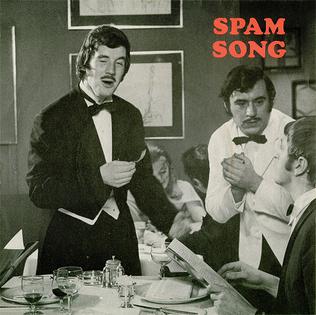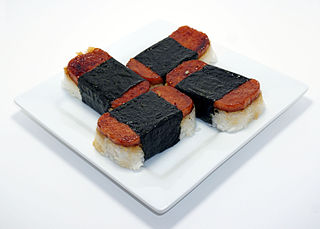
"Spam" is a Monty Python sketch, first televised in 1970 and written by Terry Jones and Michael Palin. In the sketch, two customers are lowered by wires into a greasy spoon café and try to order a breakfast from a menu that includes Spam in almost every dish, much to the consternation of one of the customers.
A metasyntactic variable is a specific word or set of words identified as a placeholder in computer science and specifically computer programming. These words are commonly found in source code and are intended to be modified or substituted to be applicable to the specific usage before compilation. The words foo and bar are good examples as they are used in over 330 Internet Engineering Task Force Requests for Comments, which are documents explaining foundational internet technologies like HTTP (websites), TCP/IP, and email protocols.

Spam is a brand of canned cooked meat made by Hormel Foods Corporation. It was first introduced in 1937 and gained popularity worldwide after its use during World War II. By 2003, Spam was sold in 41 countries on six continents and trademarked in over 100 countries.

Spamming is the use of messaging systems to send an unsolicited message (spam), especially advertising, as well as sending messages repeatedly on the same site. While the most widely recognized form of spam is email spam, the term is applied to similar abuses in other media: instant messaging spam, Usenet newsgroup spam, Web search engine spam, spam in blogs, wiki spam, online classified ads spam, mobile phone messaging spam, Internet forum spam, junk fax transmissions, social spam, spam mobile apps, television advertising and file sharing spam. It is named after Spam, a luncheon meat, by way of a Monty Python sketch about a restaurant that has Spam in every dish and where patrons annoyingly chant "Spam!" over and over again.
The Spam Prevention Early Warning System (SPEWS) was an anonymous service which maintained a list of IP address ranges belonging to Internet service providers (ISPs) which host spammers and show little action to prevent their abuse of other networks' resources. It could be used by Internet sites as an additional source of information about the senders of unsolicited bulk email, better known as spam.
Escalation is the process of increasing or rising, derived from the concept of an escalator. Specific uses of the term include:

Mobile phone spam is a form of spam, directed at the text messaging or other communications services of mobile phones or smartphones. As the popularity of mobile phones surged in the early 2000s, frequent users of text messaging began to see an increase in the number of unsolicited commercial advertisements being sent to their telephones through text messaging. This can be particularly annoying for the recipient because, unlike in email, some recipients may be charged a fee for every message received, including spam. Mobile phone spam is generally less pervasive than email spam, where in 2010 around 90% of email is spam. The amount of mobile spam varies widely from region to region. In North America, mobile spam has steadily increased from 2008 ed 2012, but remains below 1% as of December 2012. In parts of Asia up to 30% of messages were spam in 2012.

Email spam, also known as junk email, is unsolicited messages sent in bulk by email (spamming).
Email marketing is the act of sending a commercial message, typically to a group of people, using email. In its broadest sense, every email sent to a potential or current customer could be considered email marketing. It usually involves using email to send advertisements, request business, or solicit sales or donations, and is meant to build loyalty, trust, or brand awareness. Marketing emails can be sent to a purchased lead list or a current customer database. The term usually refers to sending email messages with the purpose of enhancing a merchant's relationship with current or previous customers, encouraging customer loyalty and repeat business, acquiring new customers or convincing current customers to purchase something immediately, and sharing third-party ads.
SORBS is a list of e-mail servers suspected of sending or relaying spam. It has been augmented with complementary lists that include various other classes of hosts, allowing for customized email rejection by its users.

Spam musubi is a popular snack and lunch food in Hawaii composed of a slice of grilled Spam on top of a block of rice, wrapped together with nori in the tradition of Japanese omusubi.
Spamming, in the context of video games, refers to the repeated use of the same item or action. For example, "grenade spamming" is the act of a player throwing a large number of grenades in succession into an area. In fighting games, one form of spamming would be to execute the same offensive maneuver or combo so many times in succession that one's opponent does not receive a chance to escape the series of blows.
Laura Betterly, also known as Laura Betterly-Blom as the head of Data Resource Consulting, became notorious for sending large quantities of commercial e-mail in the early 21st century when she cracked as a joke, "call me the Spam Queen" to a Wall Street Journal reporter.
TrashMail (TrashMail.net) is a free disposable e-mail address service created in 2002 by Stephan Ferraro, a computer science student at Epitech Paris which belongs now to Ferraro Ltd. The idea was to create temporary email addresses to protect against spam mail. It mainly forwards emails to a real hidden email address.

Sproose was a consumer search engine launched in August 2007 by founder Bob Pack. Sproose provided web search results from partners including MSN, Yahoo! and Ask.com. Sproose intended to have better-quality results than algorithmic search engines because its users were able to influence the ranking order of the search results by voting for websites and deleting bad or spam results. It had been compared to Digg and Mahalo.com, among other social search websites.
Disqus is a worldwide blog comment hosting service for web sites and online communities that use a networked platform. The company's platform includes various features, such as social integration, social networking, user profiles, spam and moderation tools, analytics, email notifications, and mobile commenting. It was founded in 2007 by Daniel Ha and Jason Yan as a Y Combinator startup.

Yandex Browser is a freeware web browser developed by the Russian web search corporation Yandex that uses the Blink web browser engine and is based on the Chromium open source project. The browser checks webpage security with the Yandex security system and checks downloaded files with Kaspersky anti-virus. The browser also uses Opera Software's Turbo technology to speed web browsing on slow connections.

India–Lebanon relations are warm and cordial. Lebanon maintains an embassy in New Delhi, whilst India maintains one in Beirut.








